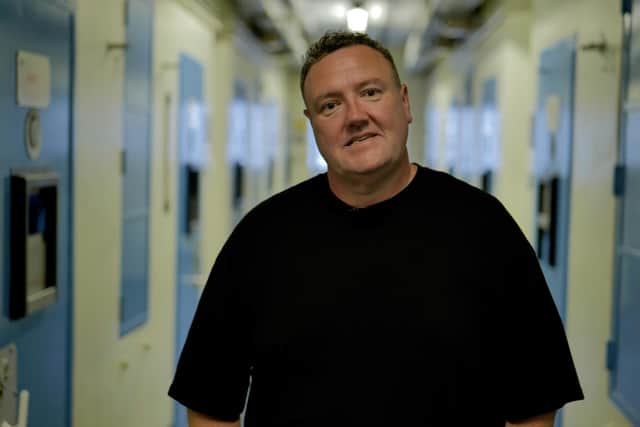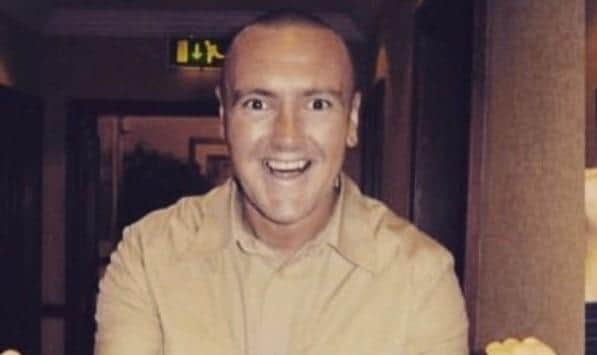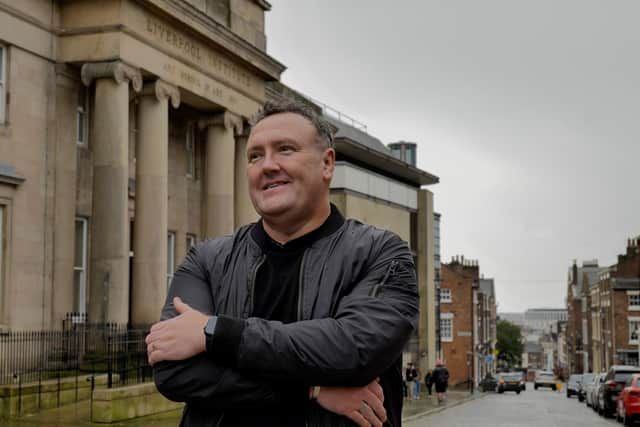The former prolific drug dealer who turned his life around and supports others to leave crime behind
From the age of just 17, Stuart Otten was a prolific drug dealer. But in his early twenties, facing long-term prison and potential death, Stu came to a crossroads and gradually turned his back on his former life. Now based in Rotherham, the 46-year-old has made a film to share his story and to highlight the effects of trauma on criminality.
Family life, Stu reflects, was “normal, healthy and well-rounded”, growing up with churchgoing parents on a Liverpool council estate in the 1980s. But outside of the home, "it was a difficult place” with drugs and criminality, he says.
Advertisement
Hide AdAdvertisement
Hide AdStu never felt like he fitted in. His childhood was filled with severe bullying which went on for years. On a daily basis, he’d be beaten up by other children, verbally attacked and humiliated. The relentlessness left him angry, isolated and paranoid, and badly affected his mental health. He became more involved with gangs on his estate, hiding violence, fighting and crime from his loving parents back at home.


“My mum and dad had some concerns but to a large extent, I kept a lot from them,” Stu reflects. “I didn’t let them see a lot of what was going on outside the house. At Church on a Sunday I was a model child to all intents and purposes…I can really recall there was almost like two personalities…a definite choice on my part to actively do things that would make me appear to fit in or be the big man in the group.”
Stu began attending a kickboxing class and his time training at the local youth club became his social life. He recalls being in awe of some of the older guys and their flashy lifestyles – designer clothes, expensive watches, fast cars – and respect from their peers. The men were working as doormen around the pubs and clubs of Liverpool and at 17, secured Stu a job doing the same. Within weeks of starting, he was introduced to a criminal underworld and began dealing the likes of cocaine, ecstasy and cannabis.
“I suppose now we’d call it grooming,” Stu says. “Back then, I saw it as making friends and feeling part of a brotherhood, but it’s clear they were drawing me into something and I suppose they saw vulnerability in me that they could exploit. The more they asked me to do, the more I did.”
Advertisement
Hide AdAdvertisement
Hide AdWith the dealing came a world of gangs and violence. Stu was often used as the person to threaten others and go after them for drug money. Violence was sent his way too, by rival gangs and Stu kept knives and hammers in his house and a machete under his bed. “I became so paranoid that I’d have weapons all over my house just in case somebody came to get me,” he says. “I was living in constant fear, looking over my shoulder that either the police would come and arrest me or someone would come and take my life.”


Things intensified into his twenties. Other criminals and authorities were on Stu’s back, and he’d find himself in and out of custody whilst worrying that one wrong move could end in his murder. His family relationships became strained and he hit a point of mental health crisis and began feeling suicidal.
Stu knew something had to change. He didn’t want to live the life he’d been living, but it was difficult to break away from the toxic environment of crime and drugs. “Constantly in the background there was a conscience saying to me that’s not who you are,” he says. “But the battle to change things when you’re in that world and surrounded by those people, it’s so difficult to get out of.”
Stuart did eventually manage to turn his back, finding a sense of community, belonging and acceptance in a local Church. At 23, he began working in a care home with vulnerable adults and found his calling in helping others. He later specialised in supporting people dealing with trauma and mental health issues, having turned to counselling services to address his own struggles and learning more about the impact of trauma. “I started to work in the methodology of addressing what’s happened to you as opposed to what have you done,” he says.
Advertisement
Hide AdAdvertisement
Hide AdStu has now lived in South Yorkshire for 17 years and back in 2016, joined Causeway, a charity headquartered in Sheffield which supports survivors of modern slavery and those caught in cycles of exploitation and crime. In his time there, Stu has spearheaded new crime reduction services, supporting people through trauma and working to break cycles that lead to criminality.


Now Causeway’s Head of Criminal Justice Services, he has supported thousands of individuals just like him. By working with those who commit crime, the idea is that the charity can support the perpetrator to change, whilst reducing the number of victims of crime and making communities safer.
Now, Stu is sharing his own story in a special film as part of Causeway’s latest campaign, Breaking Cycles: Building Lives, which launched this week. It aims to raise awareness of crime reduction approaches and the effects that childhood trauma has on adults going into criminality.
“People underestimate the link,” Stu says. “I deeply regret what I’ve done in the past, however I use that every single day to drive forward the work I do now. We all want a world without crime, but we can’t bury our heads in the sand. We need to understand and work closely with those who commit crime to break those cycles, and build a better world for everyone. I wouldn’t be where I am today if I wasn’t once given that chance for change.”
For more on the campaign, visit www.wearecauseway.org.uk
